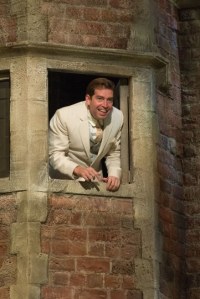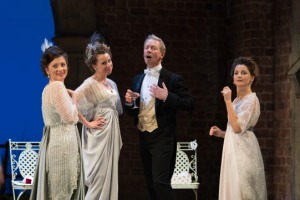
I love live theatre. There’s something about the sheer immediacy of it, that gives it an impact film and television just don’t have. So, I wasn’t totally sure about the RSC’s broadcasts of its plays to cinemas. Could it really work? However, I love Shakespeare, and Stratford upon Avon is a long way from Canterbury, so I duly toddled down to our lovely local Curzon cinema to watch Love’s Labour’s Lost last night.
And does it work? Well, yes, it does. There are losses in terms of the immediacy, and that thrilling tightrope-walking feeling of knowing because it’s live it could go wrong (although perhaps the latter is just me, after what happened the last time I saw an RSC production – see previous blog The Heroism of the Stage Manager for details). But there are gains too, in terms of being able to see things in close up – whether that’s the actors’ reactions, or the costumes.

The play is set in 1914, and the costumes are accordingly fabulous. I am seriously coveting the girls’ evening frocks, despite not really having the lifestyle to make use of them. But what is it with productions of Love’s Labour’s Lost and the late Edwardian era?* The only other time I’ve seen this slightly neglected play was the RSC’s mid 90’s version, which was also set in the Edwardian period, and also alluded – as this version does- to the Fist World War at its end. That production featured a certain Christopher Luscombe in the role of Moth. Last night’s production was directed by the very same Christopher Luscombe.
Whether it’s coincidence or borrowing, I don’t really mind, as the period suits the play. The plot is essentially a Shakespearean rom-com – the King of Navarre and his three companions swear to dedicate the next three years to study, forsaking fun, frivolity, and (especially) women. Of course, immediately after they’ve made this vow, the Princess of France arrives with her three ladies, and all four men promptly fall in love. All of this works brilliantly with the atmosphere of that ‘last summer’ before the horrors of war. But at the end of the play (spoiler alert!), instead of being united, the lovers have to part – the lost labours of the title. The image of men going off to war, and an uncertain destiny, leaving their sweethearts behind, fits the melancholy mood of the end of the play.
Even by RSC standards, this is a lavish production, particularly in terms of the set, which is based on Charlcote Park near Stratford. The production is being paired with one of Love’s Labour’s Won (or Much Ado About Nothing as it’s more commonly known) which features mostly the same cast and the same setting. Presumably two plays on the same set means a bigger budget. It’s also very funny, especially the scene in which the four men eavesdrop on each they as they confess to breaking their vow and falling in love. There’s also a troupe of comedy rustic characters of the type Shakespeare specialised in.
This being the RSC, there are no weak links in the cast, but the absolute stand out is Edward Bennett as Berowne. Where has this man been for my theatre going life so far? (Actually a quick Google reveals him to have been David Tennant’s Hamlet understudy- who had to go on at very short notice when Tennant hurt his back. Bennett got a standing ovation.) Bennett has that rare thing that marks really great Shakespearean actors – he doesn’t just speak the words, he absolutely owns them. Note to the RSC casting department – hang on to this one. Do not let him escape.
The only part of this production that didn’t quite work for me was the end song – having it sung by the entire company didn’t seem to work with the hierarchical Edwardian setting, and it went on a bit too long. But that’s a fairly minor quibble, and the music and songs in the rest of the play enhance it.
So, slightly against my expectations, I’m a convert to this live broadcast thing. Much credit for this must go to the excellent work by screen director Robin Lough, who wisely resists the temptation to go too filmic, and rightly structures the broadcast as a live action experience, and does it well (as an old TV news hack, I know that this is not an easy thing to get right). It could never entirely replace live theatre for me, but I am now off to book my tickets for the screening of Love’s Labour’s Won next month.
PS- One of the advantages of the screening is the vt’s prepared for us to watch whilst the audience are settling down, buying ice creams during the interval etc. The interval piece on set design, which gave us a glimpse of the fantastically detailed model created by designer Simon Higlett was fascinating. Before the show, we got an introduction to the play featuring several of the actors (slightly scruffy knitwear in vogue amongst the boys), including the aforementioned Edward Bennett suggesting Shakespearean chat up lines. If you’re reading this Edward, the concensus on Twitter is that you should definitely try it. Being married, I couldn’t officially comment, but I suspect being chatted up with Shakespeare would probably have me contemplating adultery. (Note to darling husband: only contemplating, you understand).
The film about designing the play is here: https://www.youtube.com/watch?v=QjC0MBu-zuM The introductory film doesn’t seem to have been posted yet.
This is the Love’s Labour’s Won trailer https://www.youtube.com/watch?v=8Mw4Cj6hVY4
*History pedants- I am aware that since Edward VII died in 1910, 1914 isn’t technically the Edwardian era- but it is a useful shorthand.